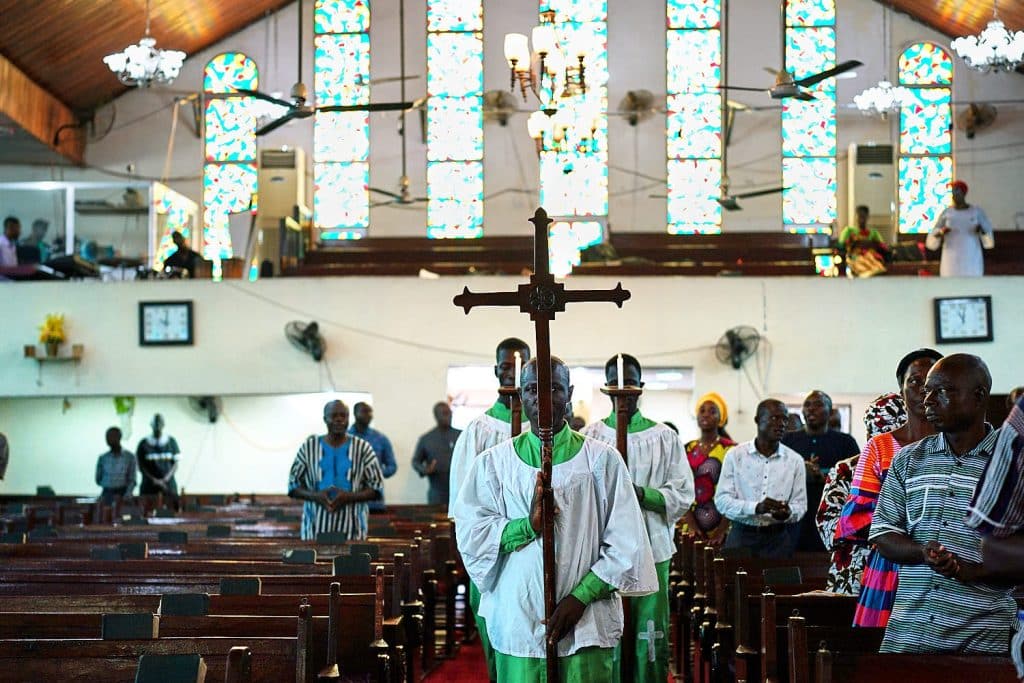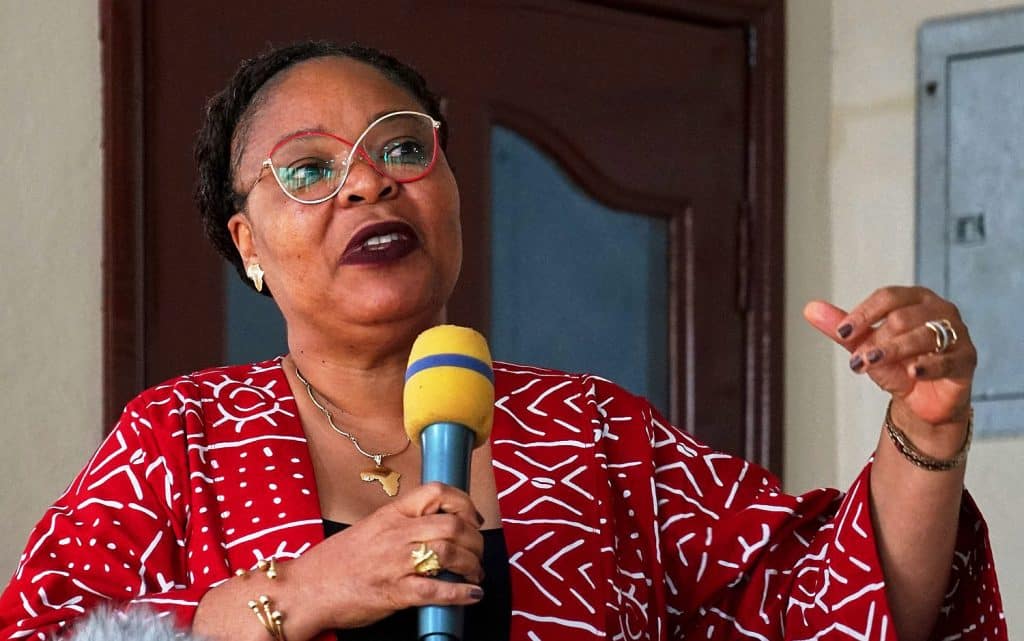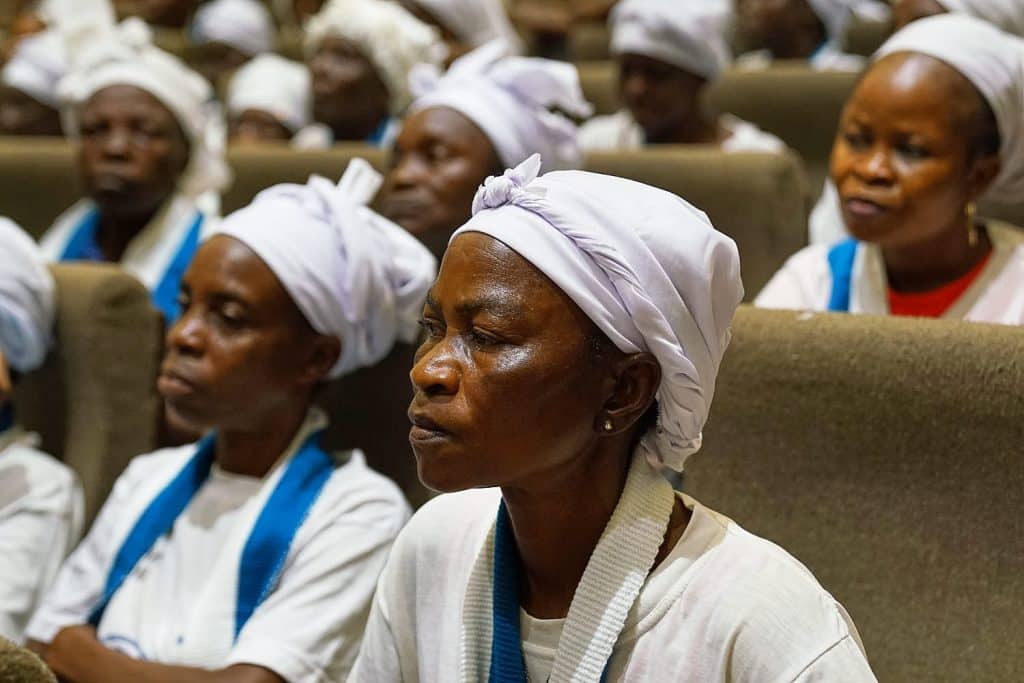
MONROVIA, Liberia — Nobel Peace Laureate Leymah Gbowee stood behind a wooden podium in a cramped conference room and recounted her narrow escape from one of the worst massacres in Liberia’s civil war, a devastating conflict that ended 20 years ago this August. Gbowee, then a recent high school graduate, was enrolled in a biology course at the University of Liberia with dreams of becoming a pediatrician when the war that began on Christmas Eve in 1989 threw Liberians into chaos.
During the final days of July 1990, soldiers were circling the Lutheran Church Compound, where Gbowee and her family sought refuge from the fighting between the army and rebel factions, who had taken up close positions in the tiny seaside capital here. The soldiers entered the compound and shot dead a girl who had been yelling prayers and took away others, Gbowee said.
Her uncle, who was a doctor, negotiated their exit from the compound with a general who warned: “[T]he group that is coming tonight will be worse than us.”
Gbowee’s family, who then sought refuge with a Lebanese family a few blocks away, woke up to the “cries of people” and learned of the massacre that killed more than 600 men, women and children in St. Peter’s Lutheran Church, where she had prayed during her teenage years and that was located near the compound that she and her family had fled.
“I remember it like it was yesterday,” Gbowee said at the conference on Aug. 18 of her country’s vicious civil war and the ensuing relative peace.
More than a decade after the massacre, she would lead groups of Christian and Muslim women dressed in white who prayed to protest the war in 2003, for which she won the Nobel Peace Prize in 2011, sharing it with Ellen Johnson Sirleaf, a former Liberian president, and a Yemeni journalist, Tawakkol Karman.
Gbowee, who continues to work with women and girls in Liberia, is now speaking out in support of establishing a war crimes court, an effort that has gained momentum in recent years and has fueled prosecutions of Liberians accused of war crimes in both Europe and the United States.
One recent case, led by the California-based Center for Justice and Accountability (CJA) and the Liberia-based Global Justice and Research Project, involved a man named Moses Thomas, a former Liberia military commander living in Philadelphia, who was found guilty by a US court for directing the Lutheran church massacre.
You might be interested in these posts.
Brutal encounters, horrific losses and near misses are common among the stories of survivors of Liberia’s civil war, which saw at least 250,000 people killed, two million displaced, children forced onto the frontlines as soldiers and civilians raped, mutilated and maimed. This August, the country is marking 20 years since the end of the two back-to-back wars, which began on Dec. 24, 1989 and ended on Aug. 18, 2003, with the signing of the Comprehensive Peace Agreement, known as the Accra pact. It sealed the deal for the war’s conclusion and the departure of the rebel-leader-turned-president Charles Taylor.
While the current government of President George Manneh Weah, who is running for re-election, was preparing to hold an event in an auditorium down the road here in Monrovia, also celebrating the 20 years of peace, Gbowee claimed that Liberia, a coastal country of 5.2 million people in West Africa, was merely celebrating two decades of “stability.” She cited corruption, lack of access to medical care, inequality and a poor education system as ongoing barriers to peace, along with a culture of impunity with roots in the civil war.
“At the signing of the comprehensive agreement, people had hope because an agreement had been signed and something called justice will finally happened,” she said on Aug. 18. “Today, Liberians continue to say we have peace without the understanding that there is an urgency for us to tackle issues of justice. Everything that we see happening in this country is because of our — this attitude of impunity. Until we begin to start dealing with those first who gave us war on a silver platter, stop rewarding them with votes; until we make justice issue key for our daily life, we will not see peace.”
As a Unicef Goodwill Ambassador during the disarmament process, Weah said he supported a war crimes court, with senior members of his party campaigning to establish one until after his election to the presidency. During his UN General Assembly speech in 2019, Weah acknowledged the plight of survivors and made ambiguous statements that indicated his government was considering establishing a war crimes court, although he said he had referred the matter to the country’s legislature. He denied claims by the local press that he had spoken in support of such a court and is now running again as president with the ex-wife of Taylor, Jewel Howard Taylor, who has spoken out against prosecutions, saying Liberia should move on.
Resistance to a war crimes court began, however, after the recommendations of Liberia’s Truth and Reconciliation Commission, or TRC, called for prosecution of key figures and the barring of people from participation in politics, including then-president Sirleaf. After a long string of negotiations, Sirleaf gave limited testimony in a closed hearing on the final days of commission hearings, admitting to having given the rebel Charles Taylor $10,000 during the early stages of the conflict. (Sirleaf was president of Liberia from 2006 to 2018.)
The conference that Gbowee spoke at last Friday was organized by the Secretariat for the Establishment of a War Crimes Court in Liberia (Sewacol) and the Center for Justice and Accountability to lobby for such a court. In the lead-up to presidential and legislative elections in October, Sewacol developed a Post-Accra Declaration, or pledge, that political parties could sign, committing to support the creation of such a court, the building of memorial sites for the more than 200 massacres that took place during the civil war and to exploring how to “provide reparations and rehabilitation to survivors and victims.”
Aaron Weah, a founder of Sewacol, who is writing a Ph.D. on the memorialization of Liberia’s civil war, said the purpose was to get the 18 political parties participating in this year’s elections to sign on. (He is not related to President Weah.) However, only one presidential candidate, Tiawan Gongloe, a human rights lawyer, has signed on. Alexander Cummings, a presidential candidate for the Collaborating Political Parties, a major political party, told FrontPage Africa that he would support such a court, but he did not attend the event or sign the declaration.
“I believe that the issue of what people think about the establishment of a war crimes court should be an election issue and the candidates should state their views on it clearly,” Gongloe, a first-time candidate, told PassBlue after the conference. “If the Liberian people really want accountability, they should reject those parties that are fraternizing with war criminals.”
Gongloe, who leads the Liberian People’s Party, campaigns in a traditional tunic and hat woven in the Liberian flag colors of red, white and blue and carries a thin broom made of sticks as a symbol for his campaign promise to “sweep out corruption.” Gongloe, a lawyer-turned-politician who was tortured by Taylor’s security forces, has been a long-time advocate of a war crimes court, though he is an outlier in Liberia’s political scene.

The goal to establish a war crimes court in Liberia occurs as another country across the world, Ukraine, is making slow progress to originate a special tribunal to prosecute top Russian leaders for the crime of aggression as Russia attacks Ukraine. However, there has been no political will in Liberia to do such a thing, and the crimes committed during its civil war fall outside the scope of the International Criminal Court’s Rome Statute, which is mandated to prosecute crimes committed only after July 2002. Liberia’s war ended a year later, and it did not ratify the statute until 2004, barring the possibility of the court pursuing Liberian cases.
In neighboring Sierra Leone, leading figures of the war, including Taylor, were tried in a hybrid UN court. The Liberian government must approve such a court at a legislative level or presidential level; it never has done so, partly because many politicos have been implicated in the war. Taylor was found guilty of war crimes, crimes against humanity and other charges in 2012; he was sentenced to 50 years in prison, where he remains in Britain.
Besides pushing for a war crimes court, Gbowee and others argue for a clear narrative and understanding about what led to the civil war. Liberia’s history, as taught in schools, often starts with the story of the freed American slaves who came and settled in the early 1800s. But as has been the case in much of the West, the history fails to acknowledge the Indigenous people who lived in the Liberian region before the freed slaves arrived. It also doesn’t cover the civil war in depth.
In 1847, Liberia became the first independent country in West Africa, but it was ruled by the settlers who put native people to work on rubber plantations, made them pay “hut taxes” and largely denied them access to university education and political office for more than 100 years. The war was preceded by a brutal crackdown on protestors, known as the Rice Riots, and a coup in 1980, during which native, noncommissioned officers, led by Samuel Kanyon Doe, killed President William Tolbert in his presidential mansion before publicly executing his ministers on a beach. (Doe became president in 1980.)
After an attempted coup by a soldier, Thomas Quiwonkpa, from the Gio ethnic group, Doe, who was from the Krahn ethnic group, went after the Gio and Mano Indigenous people in murderous attacks known as the Nimba Raid. In 1985, Taylor, then a former government official who was jailed in Massachusetts for claims of government theft in Liberia, escaped the prison and plotted a rebellion. That path took him to Libya, Burkina Faso and Côte d’Ivoire, through which he and around 100 rebels entered Liberia. After the initial conflict in the 1990s, which was pitted along ethnic lines, Taylor ended up elected president in 1997. Nevertheless, rebel factions regrouped and set upon Monrovia, and the war continued from 1999 to 2003.
Former war figures and rebels have long played a leading role in postwar Liberian politics, particularly the Senate and legislature. Prince Yormie Johnson, the former head of the Independent National Liberation Front of Liberia (INPFL), a breakaway group from Taylor’s NPFL, was captured on video drinking a Budweiser while overseeing the torture of President Doe, who was later killed on Sept. 9, 1990, his dead body displayed on a hospital bed in the open air, in Johnson’s area of control. He has served in the Senate for 17 years and presides over the second-most vote-rich county.
Johnson now supports the Unity Party as well as Sirleaf’s former vice president, Joseph Boakai, after the ruling Congress for Democratic Change, or CDC, allegedly distanced itself from him, when the US sanctioned him. Another senior general from Taylor’s party and militia, Roland Duo, is running for a competing seat for the CDC in the same county.
The war crimes court in Sierra Leone, which saw not only Taylor but also other key figures in the Liberian conflict convicted, continues to remind Liberia of its own inaction to prosecute alleged war criminals. Yet some of them have also been tried in European and American jurisdictions, due to the lobbying of justice groups.
“Liberia is an unfortunate example of a political approach to atrocity accountability,” David Crane, the chief prosecutor for the Taylor trial, told me, adding that he had tried to push the US to back prosecutions in Liberia, to no avail.
In later years, the UN peacekeeping mission in Liberia (Unmil), which closed in 2018, stressed the need for reconciliation and accountability for war crimes.
“Liberia has done well to keep the peace in their country since UNMIL left more than five years ago,” Karin Landgren, who served as special representative to the UN secretary-general from 2012 to 2015 and during the Ebola outbreak, wrote to PassBlue. “There is still significant unfinished business though, in Liberians’ struggle for transitional justice.” (Landgren now heads Security Council Report, an independent group that tracks the work of the Council.)




Last year, Beth Van Schaack, the US ambassador at large for global criminal justice, visited Liberia and made comments indicating the possibility that the US would support a war crimes court if Liberians wanted to open one.
On Oct. 11, Liberians go to the polls to elect district and county representatives as well as a president in their first such voting without the security and logistical support of Unmil, or technical and financial support from other donors. Campaigning is underway, and rain-slicked corrugated iron fences and concrete walls are plastered with political posters, the faces of Weah and Jewel Howard Taylor hanging from almost every lamppost lining Tubman Boulevard, a main drag in the capital. Weah and his team are contending that victory will be seized in one round — a rarity in Liberian elections, given that a candidate must win just over 50 percent of the vote.
Back on Aug. 18, in an auditorium located in a large Romanesque, Chinese-built ministerial complex, the women with whom Gbowee protested a decade ago sat wearing white at a government-hosted event commemorating the 20 years of peace. Gbowee herself stepped in for a quick visit. But discussions soon turned to politics when a senator and member of Liberia’s pre-war political scene, who signed the Accra agreement on behalf of civil society, expressed concern about Weah’s party’s claim that it can win in one swoop, suggesting that it could lead to war.
The speeches rolled on with accounts of torture and near misses from Liberian officials and congratulations from other diplomats. Laurent Delahouse, a French diplomat serving as the European Union ambassador in Monrovia, speaking on behalf of other embassies, boomed out his last end-of-mission sign-off speech.
“Half of Liberians were not born in 2003, now do they want to experience war, as you have? I don’t think so,” he said. “Half of the Liberian population was born before 2003 and suffered the war, do you want to suffer it again? I don’t think so. In 20 years, your country has made incredible progress, incredible progress in maintaining the peace, in reconstructing the country that was torn down by war. In keeping alive a vibrant democracy and when we see what is happening around you in ECOWAS, we know how prideful that is for all of you.”
A representative of Ecowas spoke about the sacrifice and intervention of West African forces in Liberia in the 1990s. (The Economic Community of West African States is negotiating with the junta leaders in Niger after their July coup to return the country to democracy.) Weah himself has pledged support for Ecowas’s proposed standby force that is considering marching into Niger.
Weah, a tall, imposing figure and former soccer star, took to the podium, also wearing white. He hit back on the suggestion that if he won re-election in the first round it could lead to war, saying that those “who brought war” were expressing concern only about election violence.
“This is our country,” he went on. “People died for our country to be saved. We can’t continue to threaten each other and then we expect the international community to come back and say they coming to save us. That’s the wrong thing to do for the generation after us.” He then thanked the women of Liberia.
Two days later, on a drizzly Sunday morning, the Rev. Janice Gonoe led the sermon at St. Peter’s Lutheran Church, calling on Liberians to pray for a peaceful election and a good leader. Parked cars sat on a concrete basketball court that was paved over the remains of those who were executed, as people danced and prayed in pews after the sermon, where bodies once fell to bullets. Reverend Gonoe, who like Gbowee was in hiding just streets away during the 1990 massacre, heard the gunshots ringing through the night.
“People are not showing remorse, the people who did these acts, and these people stand the chance again to bring such things back into this country because nothing was done to them,” Reverend Gonoe said.
Clair MacDougall is an independent journalist who reports throughout Africa from her base in the western Sahel region, where she is currently reporting on the security and humanitarian crisis there. She holds an honor’s degree in political theory and a master’s degree from the Columbia Graduate School of Journalism. In February 2021, the International Center for Journalists awarded MacDougall for her article on the first official death of a UN peacekeeper from Covid-19, published jointly by PassBlue and The Daily Beast.
This post was originally published on this site be sure to check out more of their content.









